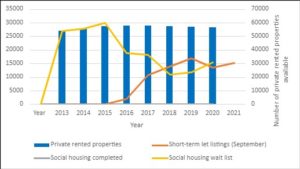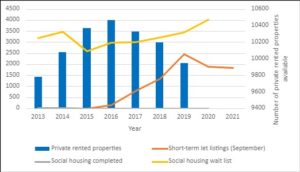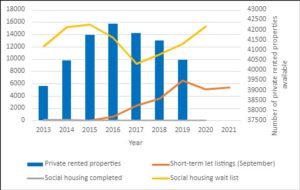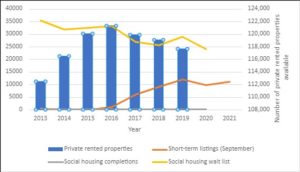CPRE research: Explosion in holiday lets is strangling rural communities
13 January 2022
- 1,000% increase in homes listed for short term lets nationally between 2015 and 2021
- 148,000 homes that could otherwise house local families were available on Airbnb-style lets in September 2021
- This compares to 176,000 rural families on social housing waiting lists.
A surge in the number of homes marketed for Airbnb-style short-term lets is crippling the residential rentals market, new research shows. The problem is most acute in staycation hotspots, where hundreds of homes previously available to rent to local people have been switched to short-stay holiday rentals. The worsening housing crisis – which is particularly acute in rural areas – has seen thousands of families added to social housing waiting lists.
A steep decline in the number of new social housing projects completed since 2013 is compounding the problem.
That is why CPRE, the countryside charity, is calling for tighter controls on second home ownership, including higher council tax on second homes and the requirement for short-term lets to have planning permission. Additionally, the definition of ‘affordable’ must be changed in national planning policy, with rents being tied to local incomes rather than market prices. To level up our rural communities, changes to planning law and policy should be committed to in the government’s forthcoming Planning Bill, requiring at least one new genuinely affordable home for every market home built.
Alex Macintyre, 37, from Plymouth, was evicted by her landlord because he would make more money listing her flat on Airbnb. She said:
‘I lived in my last flat for five years until the landlord decided to renovate and do the place up to perfection so he could rent it out on Airbnb.
‘Plymouth has become a city of holiday lets. Fewer homes available for residents means higher rents, and people being priced out of their local areas in search of a home. That erodes local communities and starves local businesses of workers. The only people who benefit are the landlords.’
In many areas social housing waiting lists could be drastically reduced or even eliminated if the number of properties advertised for short term let were available for local families instead, the analysis shows:
- In Cornwall, which saw short term listings grow 661% in the five years to September 2021, there are roughly 15,000 families on social housing waiting lists and the same number of properties being marketed as holiday lets;
- In South Lakeland, which saw a 1,231% increase in short term listings between 2016-20, roughly half the families in need of social housing could be accommodated in properties exclusively available for holiday rentals;
- In Cumbria, a 4% decline in the number of privately rented properties coincided with a 14% increase in families on social housing waiting lists since 2016; and
- In Devon, short-term lets appear to be worsening an existing housing crisis, with nearly 4,000 homes taken out of private rent and 11,000 added to short-term listings since 2016.
Crispin Truman, chief executive of CPRE, the countryside charity, said:
‘Across our most traditional rural communities, from the beaches of Cornwall to the lakes of Cumbria, homes that used to be rented to local families sit empty for much of the year. More people are pushed onto social housing waiting lists, which have been stretched to breaking point by years of underinvestment. Hard-working people are suffering and they will not easily forgive a government that promised to level them up if it leaves them falling through the cracks of a broken system.
‘It’s clear the government needs to act fast to avert a growing housing crisis. With the cost of living set to hammer people’s finances in the coming year, this is a problem that’s quickly getting out of hand. There simply has to be a government response to the fact that our rural housing supply is disappearing into an unregulated short-term rentals market that simply didn’t exist six years ago. Ministers must introduce tighter controls on second home ownership, including higher council tax on second homes and the requirement for short term lets to have planning permission.’
Separate analysis by CPRE found the demand for social housing was growing nearly six times faster than the rate of supply in rural areas. At current rates, the backlog of low-income families needing accommodation would take 121 years to clear. Figures show 8,898 households were added to social housing waiting lists in 88 rural local authority areas between 2019-20, the last year for which figures are available, with just 1,453 social homes delivered. In total 176,058 rural families were waiting for accommodation in 2020, up from 167,160 in 2019.
Selaine Saxby, Conservative MP for North Devon, said:
‘We need to make the long-term rental market more sustainable and attractive. We cannot rely on building ever more homes if they are not going to be lived in by local residents. Our excellent housing associations in North Devon do great work in building modern affordable homes, but they will not be able to keep up with demand if the balance between short term and long term private rental markets is not restored.’
Notes to editors
To view data for Suffolk, Northumberland, Scarborough, South Lakeland, Brighton & Hove, Cornwall, Cumbria and Devon, please click here.
Data collected by AirDNA starting in April 2015 using servers to collect reservation data for every listing on Airbnb and Vrbo, accounting for properties that may be listed on both websites (more information on AirDNA data here: AirDNA | How Our Data Works). Our short-term lets figures are based on the number of ‘entire place’ listings on Airbnb and Vrbo available in September 2015, 2016, 2017, 2018, 2019, 2020 and 2021. These are standalone figures for that month in each year, in that particular area.
Social housing waitlists and social housing completions information gathered from government data live tables, April 2013/14 to March 2020/21. Live Table 600 and Live Table 1006 (DLUHC, 2021). Figures on the quantities of privately rented properties in each district obtained from the ONS data set ‘Subnational estimates of dwellings by tenure, England. 2012-2019‘.
Cornwall

South Lakeland

Cumbria

Devon

For further information, case studies or to interview a spokesperson, please contact: Sam Relph, CPRE Media Officer, 020 7981 2827 / 07982 805759



